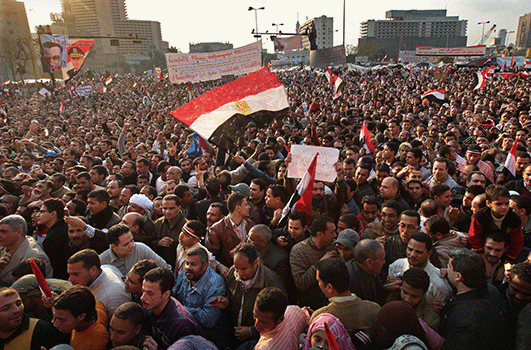Massive Protests Continue in Egypt
Tuesday, December 11th, 2012December 11, 2012
Huge crowds gathered in Egypt’s capital, Cairo, for yet another day of demonstrations either for or against the draft constitution referendum scheduled to take place on December 15. Secular groups that oppose the constitution have converged on the presidential palace. Supporters of President Mohamed Morsi and the Muslim Brotherhood have taken over Tahrir Square.
The opposition wants the referendum scrapped, arguing that the constitution was drafted by an assembly dominated by Morsi’s Islamist allies, who seek to impose an Islamic agenda, even Shari’ah law, on Egypt. In a statement issued after talks with Morsi’s representatives on December 9, the opposition National Salvation Front announced that it refuses to recognizes the draft constitution “because it does not represent the Egyptian people. . . . We reject the referendum which will certainly lead to more division and sedition.”

Hundreds of thousands of Egyptians protested against the government of President Hosni Mubarak in January 2011, leading to his resignation in February. The protests in 2012 were triggered by the policies of the new president, Mohamed Morsi, who was elected in June. (© John Moore, Getty Images)
According to experts on domestic Egyptian politics, the pro-Morsi demonstrators have formed an umbrella group calling itself the Alliance of Islamist Forces, which is made of Muslim Brotherhood and Salafist groups. Although Morsi canceled his decree of November 22 that stripped the judiciary of any right to challenge his decisions, he remains adamant that the referendum on the new constitution will take place as planned on December 15. He has ordered in the military to maintain security and to protect state institutions, giving army personnel the power to arrest civilians as they see fit.
Additional World Book articles:
- Egypt 2011 (a Back in Time article)
- The Middle East: From Fall to Spring (a special report)


